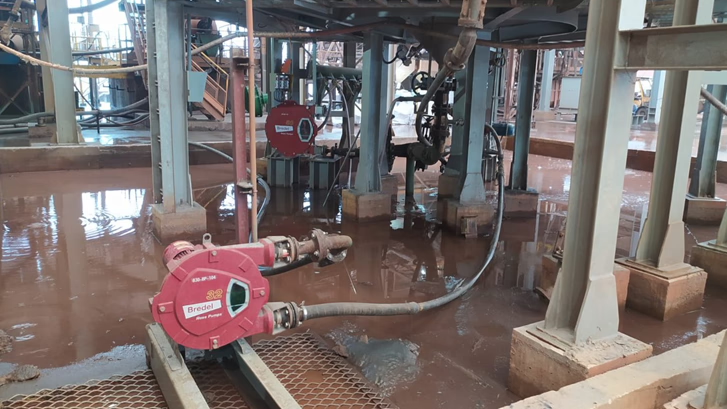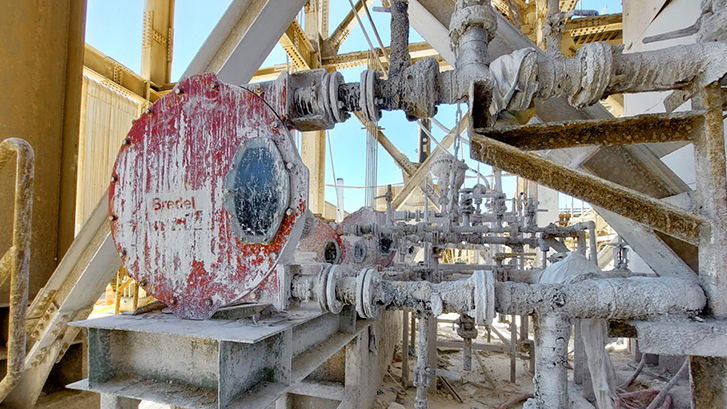
Rising demand for critical metals and minerals presents a challenge for mining companies: how to increase production while minimising downtime and environmental impact. However, peristaltic pump technology offers a solution, as a Brazilian tin mine has discovered.
Long-lasting peristaltic pumps excel at applications like transferring thickener underflow and precisely dosing reagents, leading to a more efficient mining process. This has been the case for a major Brazilian tin mining company that has experienced improved productivity, profitability, and sustainable operations since implementing a range of peristaltic pumps from WMFTS.
Four Bredel hose pumps (two Bredel 50 and two Bredel 32) have been used to transfer thickener underflow since 2022, while 21 Watson-Marlow peristaltic pumps have been effectively dosing reagents in tin and niobium flotation since 2021.
Minimal downtime, high productivity
The Bredel pumps transfer tin and niobium ore slurry with a nominal flow of 1.5 m³/h and a maximum flow of 3.6 m³/h. They are located under a thickener and the slurry is transferred from the thickener to the conveyor filter.
An important benefit for the Brazilian mining company is the reliable operation, which results in minimal downtime for maintenance, and easy maintenance for hoses and pumpheads. Compared to other pumps, hose replacements are quicker and easier to perform.
Bredel pumps are capable of handling slurry with a high content of solids and abrasive particles without premature wear of pump parts since only the internal part of the hose is in contact with the slurry, which extends the lifetime of the pump.
As the pumps are self-priming, no additional fluid is needed for a simple start-up. Bredel can also work in reverse, which can help unclog and prevent complete blockage of the line. Ore slurry is dense, which may be difficult for other pump types to handle, but for Bredel it is not a problem.
Sergio Costa, Sales Engineer at WMFTS in Brazil, said: “The main challenge was pumping slurry with a high percentage of solids, sometimes up to 65% solids, with low maintenance, and Bredel has been able to do this. The most important benefit for the customer was the greater availability of pumps, with low maintenance and greater process availability due to the reliability of the Bredel hose pumps. The mining company is using EPDM hoses which have excellent chemical resistance.”
Importance of accurate dosing
The Brazilian mining company has improved the reliability and efficiency of its tin and niobium ore concentration and recovery process by replacing diaphragm pumps with Watson-Marlow peristaltic pumps. They are using eight Watson-Marlow 530 pumps, four Watson-Marlow 630 pumps, and nine Qdos chemical metering and dosing pumps to accurately and consistently dose different reagents:
- Tin flotation: fluosilicic acid, oxalic acid, collector, sparkling agent, xanthate, among others. Flow between 0.1 mL/m and 3000 mL/m.
- Niobium flotation: caustic soda, collector, oxalic acid, citric acid, among others. Flow between 15 mL/m and 3000 mL/m.
Sergio Costa, Sales Engineer at WMFTS in Brazil, said: “When used in the flotation process, Qdos and Watson-Marlow pumps provide accurate and controlled dosing of chemical reagents, ensuring the efficiency and stability of the process. The easy maintenance of the pump, which only requires hose or pumphead replacement, was a point that stood out in their decision.

“The chemical compatibility of our hoses and pumpheads is also important for flexibility in dosing different chemicals. Our pumps are able to run dry, and in the case of reagent lacking, this will not damage them. As the pumps are self-priming, it makes them easier to handle and run, with no accessories replacement required. The easy adjustment of the pump flow, combined with its accuracy, provides precise control over the addition of reagents in the flotation process.”
Peristaltic pump solutions from Watson-Marlow ensure that mining companies do not overdose in their processes and so avoid:
- High reagent chemical costs
- Increased water and effluent treatment costs due to the higher reagent concentration
- Excessive foam formation causing flotation tanks to overflow and foam removal difficulties
- Saturation of mineral adsorption sites, leading to reduced recovery of valuable minerals
- Destabilisation of air bubbles, causes adhesion between bubbles and reduced mineral capturing efficiency
- Potential risk for operators and the surrounding community to the mine site due to excessive chemical reagent handling and exposure
Also, Watson-Marlow peristaltic pumps help mining companies avoid problems caused by underdosing, such as:
- Decreased separation efficiency due to inadequate collector amount resulting in lower recovery of valuable minerals
- Lower quality concentrate with fewer desired minerals recovered and more unwanted minerals remaining in the final product
- Loss of valuable minerals in the tailings leads to less total recovery and reduced process efficiency
- Increased production costs due to reduced recovery of valuable minerals, requiring processing of more ore to achieve the same production levels
- Operational problems due to inconsistencies, leading to production stoppages and adjustments to optimise separation
- Higher energy consumption from processing more ore to compensate for lower recovery of valuable minerals, increasing the total operational cost
Pump solutions for sustainable mining
Watson-Marlow, Qdos and Bredel pumps are being used by the Brazilian mining company to improve its sustainable operations by minimising:
- Impact on the local environment by mining operations
The precise dosing capabilities of Qdos and Watson-Marlow pumps ensure that only the necessary amount of reagents are used. This minimises chemical waste, lowers effluent treatment costs, and reduces the risk of spills that could contaminate soil and water.
- Water consumption
Bredel, Watson-Marlow and Qdos pumps can dry run and self-priming. This eliminates the need for water priming processes, significantly reducing water consumption – a vital consideration in dry regions.
- Energy use
Watson-Marlow and Qdos pumps are highly energy-efficient, which helps reduce energy consumption in mining operations.
- Waste production
The durability of Bredel, Watson-Marlow and Qdos pumps minimises breakdowns and maintenance, which results in fewer spare parts and less industrial waste.
Bredel, Watson-Marlow and Qdos pumps are being used as part of the mining process to produce tin of the highest purity, as well as niobium and tantalum at the mine in northern Brazil. Tin is crucial for electronics used in green energy and electric vehicles, while niobium strengthens steel and is used in applications for jet engines, medical equipment, and batteries.
The successful use of peristaltic pumps from WMFTS at this tin mine demonstrates how this technology empowers mining companies to achieve their production and sustainability goals. By ensuring reliable operation, reduced downtime, and precise dosing, WMFTS peristaltic pumps play a vital role in driving profitability and environmental responsibility within the mining industry.
Our solutions for the mining industry





